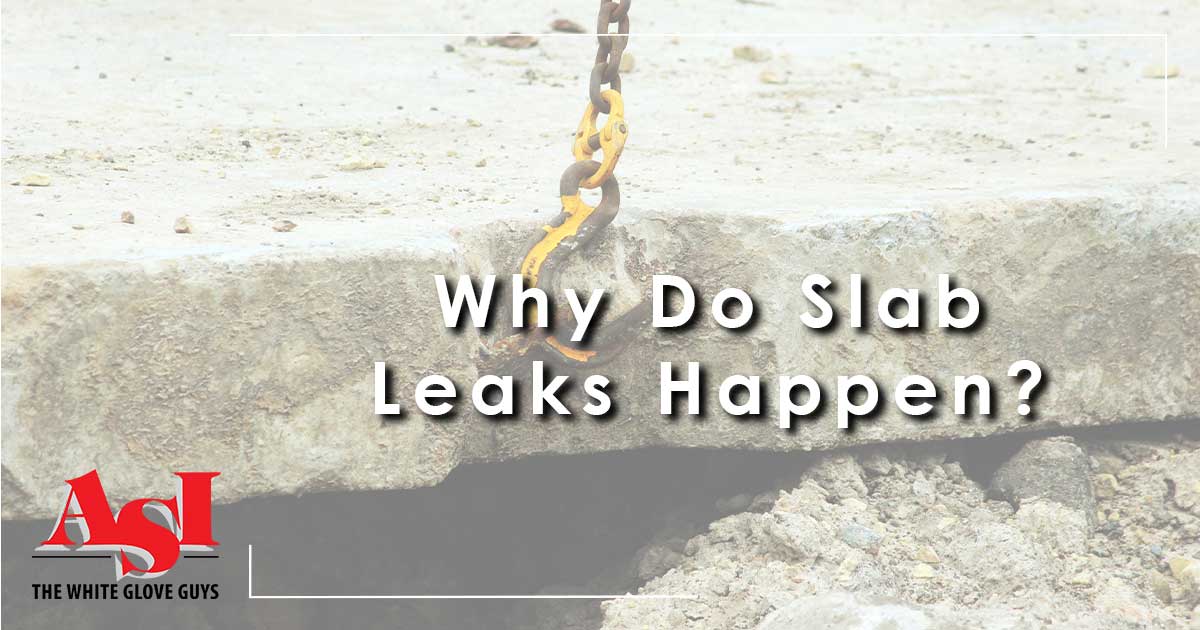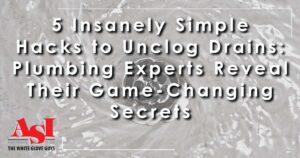Many homes and structures in San Diego are built on a slab foundation. This type of foundation is concrete slab, and within the concrete are the structure’s plumbing system. This system is efficient and cost effective, however, over time pipes can corrode and break.
Once a pipe in a slab foundation is damaged, it causes leaks that can compromise the integrity of your home. If left, they can cause the soil to shift, leading to uneven floors and a slow sinking into the ground.
Slab leaks are common, but with the proper slab leak detection methods and a professional repair, you can keep them from ruining your whole home.
What is a Slab Leak?
Many houses are constructed on a concrete slab. Embedded in the concrete are the main water supply lines and other drain lines. As we mentioned above, this is more economical, but makes dealing with leaks a huge pain.
Concrete slab leaks often start small – you may not even notice them at first. As the leak worsens, however, it creates more moisture, more shifting soil, and less stability, compromising the structure and safety of your home.
Signs You Have a Slab Leak
Slab leaks aren’t something many homeowners know about. Slow leaks also happen incrementally, so homeowners don’t notice something wrong until they have serious repairs.
Here are some signs of a slab leak:
- High water bills
- The sound of rushing water with no open taps
- Cracks or splits in the foundation
- Dampness or discoloration in floor coverings
- Warm spots on floors
- An odor from the floor or walls
- Uneven growth in the lawn
- Shifting soil around the house
Why Do Slab Leaks Happen?
There are numerous causes of slab leaks, such as:
Bad Construction
Poor quality pipes and improper installation are among the biggest causes of slab leaks. Water pipes with damage like bends or kinks are weakened, leaving vulnerable spots for a possible leak, or burst.
As time goes on, the weak spots only weaken further from the pressure of the flowing water. Copper pipes are the most vulnerable, but any pipe can spring a leak if it’s damaged or improperly installed.
Soil Shifts
Shifting soil can cause problems with the pipes and the slab foundation. The soil moves, bending and weakening the pipes and connections.
Earthquakes are another big cause of slab leaks. The vibrations in the ground loosen the joints between pipes or force a crack in a pipe, causing leaks.
In either case, the slow leak adds more water to the ground, forcing the soil to shift or expand more. When the pressure builds, it needs to escape, and that’s often through a cracked area of the slab. This can lead to wet spots on your floors, but in severe cases, the floor could have a substantial burst that floods your house.
Poor Water Quality
Areas with hard water are prone to pipe damage. Hard water contains minerals like calcium and magnesium that have the potential to build up in pipes and damage them. The degraded pipes end up with weak points and eventual leaks.
Abrasion
Another major cause of slab leaks is abrasion. With regular use, pipes rub against the concrete, gravel, or other nearby pipes. Over time, the friction wears them down and leaves weak points to spring a leak or disconnect at a joint.
Hot water is at the greatest risk from friction. These pipes expand as they heat up, causing them to rub against the surrounding hard materials more, but any pipe can suffer damage from long-term abrasion.
Your Home is Your Biggest Investment
Older homes are at the greatest risk for slab leaks because they have copper or galvanized steel pipes, which aren’t as durable. Long periods of pressure and stress also weaken pipes and increase the likelihood of a leak.
Like the rest of your home, your pipes should have regular maintenance and checkups to make sure everything is in good condition. Slab leak detection can help you repair the problem while it’s small and relatively inexpensive, rather than waiting until it causes foundation damage or water damage.
Think you may be dealing with a slab leak? Call ASI, the White Glove Guys with all of your plumbing questions.







